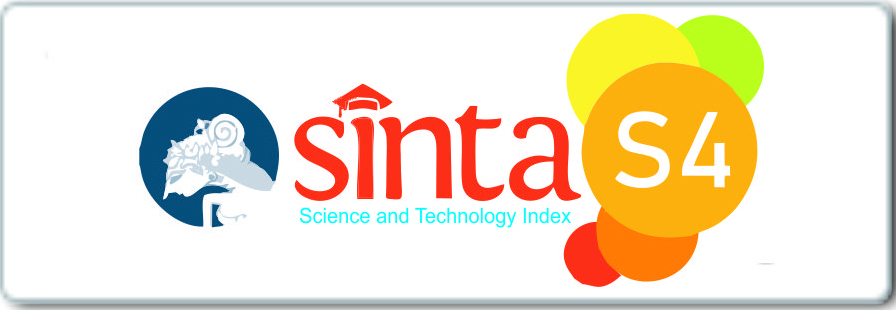The Antibacterial Activity of Red Betel (Piper crocatum) Leaf Extract toward Staphylococcus aureus
Downloads
Background: Red betel (Piper crocatum) is a plant that grows a lot in the tropics, especially Indonesia. The use of red betel Background: Red betel (Piper crocatum) is a plant that grows a lot in the tropical area, especially Indonesia. The use of red betel leaves for medicine is due to the fact that betel leaves contain a lot of essential oils. Purpose: To examine the antibacterial activity of red betel leaf extract against Staphylococcus aureus by investigate at the minimum inhibitory concentration (MIC) and minimum bactericidal concentration (MBC) values. Methods: This study used an in vitro laboratory experiment as its research method. The post-test only control group design experiment was used in this study, in which the experimental and control groups were not chosen at random and each of the two groups was compared. Results: Red betel leaves that had been extracted at a concentration of 100% were diluted into several concentrations, namely 50%, 25%, 12.5%, 6.25%, and 3.75%. The results of this dilution obtained the minimum inhibitory concentration (MIC) value of red betel leaf extract against Staphylococcus aureus bacteria at a concentration of 6.25%, while the minimum bactericidal concentration (MBC) value was obtained at a concentration of 12.5%. Conclusion: The MBC value in this study was in red betel leaf extract with a concentration of 12.5%, and the MIC value in this study was in red betel leaf extract with a concentration of 6.25%.
Najafi MH, Taheri M, Mokhtari MR, et al. Comparative study of 0.2% and 0.12% digluconate chlorhexidine mouth rinses on the level of dental staining and gingival indices. Dent Res J (Isfahan). 2012;9(3):305-308.
Lister INE, Ginting CN, Girsang E, Nataya ED, Azizah AM, Widowati W. Hepatoprotective properties of red betel (Piper crocatum Ruiz and Pav) leaves extract towards H2O2-induced HepG2 cells via anti-inflammatory, antinecrotic, antioxidant potency. Saudi Pharm J. 2020;28(10):1182-1189. doi:10.1016/j.jsps.2020.08.007
Mamun Or Rashida M, Shafiul Islam M, Azizul Haque M, Arifur Rahman M, Tanvir Hossain M, Abdul Hamid M. Antibacterial Activity of Polyaniline Coated Silver Nanoparticles Synthesized from Piper Betle Leaves Extract. Iran J Pharm Res IJPR. 2016;15(2):591-597.
Rinanda T, Zulfitri, Alga DM. Antibacterial activity of red betel (Piper crocatum) leaf methanolic extracts aginst methicillin resistant Staphylococcus aureus. Proc Annu Int Conf Syiah Kuala Univ. 2012;2(1):22-24.
Kusuma SAF, Hendriani R, Genta A. Antimicrobial spectrum of red piper betel leaf extract (Piper crocatum Ruiz & Pav) as natural antiseptics against airborne pathogens. J Pharm Sci Res. 2017;9(5):583-587.
Purba MR, Steven Wijaya, Ananda Kasuma. Potential of Red Betel Leaf Extract (Piper crocatum) and Siwak (Salvadora persica) Against Staphylococcus Aureus Bacteria. Biosci Med J Biomed Transl Res. 2022;6(5):1728-1731. doi:10.37275/bsm.v6i5.504
Heliawati L, Lestari S, Hasanah U, Ajiati D, Kurnia D. Phytochemical Profile of Antibacterial Agents from Red Betel Leaf (Piper crocatum Ruiz and Pav) against Bacteria in Dental Caries. Molecules. 2022;27(9):2861. doi:10.3390/molecules27092861
Syahrul Ramadhan A, Dian Lesmana, Onggowidjaja P. Antibacterial potential of red betel Leaf (Piper crocatum Ruiz & Pav) against Fusobacterium nucleatum ATCC 25586. Makassar Dent J. 2022;11(3):315-318. doi:10.35856/mdj.v11i3.649
Khairunnisa S, Tandra TA, Sim M, Florenly F. Efektivitas Antibakteri Campuran Nanokitosan 1% dengan Berbagai Konsentrasi Ekstrak Biji Kelengkeng Terhadap Staphylococcus Aureus. J Ilm Kesehat Sandi Husada. 2020;11(1):430-440. doi:10.35816/jiskh.v11i1.319
Anugrahwati M, Purwaningsih T, Rustina, et al. Extraction of Ethanolic Extract of Red Betel Leaves and Its Cytotoxicity Test on HeLa Cells. Procedia Eng. 2016;148:1402-1407. doi:10.1016/j.proeng.2016.06.569
Jalil V, Khan M, Haider SZ, Shamim S. Investigation of the Antibacterial, Anti-Biofilm, and Antioxidative Effect of Piper betle Leaf Extract against Bacillus gaemokensis MW067143 Isolated from Dental Caries, an In Vitro-In Silico Approach. Microorganisms. 2022;10(12):2485. doi:10.3390/microorganisms10122485
Hafizah I, Aisyah Y, Hasni D. Effect of betel type (Piper sp) and concentration of betel leaf extract on quality and antibacterial activities of glycerine bar soap. IOP Conf Ser Earth Environ Sci. 2021;667(1):012016. doi:10.1088/1755-1315/667/1/012016
Kowalska-Krochmal B, Dudek-Wicher R. The Minimum Inhibitory Concentration of Antibiotics: Methods, Interpretation, Clinical Relevance. Pathog (Basel, Switzerland). 2021;10(2). doi:10.3390/pathogens10020165
Oda Y, Miura T, Hirano T, et al. Effects of 2% sodium fluoride solution on the prevention of streptococcal adhesion to titanium and zirconia surfaces. Sci Rep. 2021;11(1):4498. doi:10.1038/s41598-021-84096-x
Armansyah T, Siregar Tn, Suhartono S, Sutriana A. Phytochemicals, characterization and antimicrobial tests of red betel leaves on three solvent fractions as candidates for endometritis phytotherapy in Aceh cattle, Indonesia. Biodiversitas J Biol Divers. 2022;23(4):2111-2117. doi:10.13057/biodiv/d230446
Nugraha AP, Sibero MT, Nugraha AP, et al. Anti-Periodontopathogenic Ability of Mangrove Leaves (Aegiceras corniculatum) Ethanol Extract: In silico and in vitro study. Eur J Dent. 2023;17(1):46-56. doi:10.1055/s-0041-1741374
Nugraha AP, Ardani IGAW, Sitalaksmi RM, et al. Anti-Peri-implantitis Bacteria's Ability of Robusta Green Coffee Bean (Coffea Canephora) Ethanol Extract: An In Silico and In Vitro Study. Eur J Dent. Published online September 8, 2022. doi:10.1055/s-0042-1750803
Copyright (c) 2023 Ida Bagus Narmada, I Gusti Aju Wahju Ardani, Ahmad Alfan Surya Dilaga Zulkarnain

This work is licensed under a Creative Commons Attribution 4.0 International License.
This is an open access journal, and articles are distributed under the terms of the Creative Commons Lisence, which allows others to remix, tweak, and build upon the work non-commercially, as long as appropriate credit is given and the new creations are licensed under the identical terms.
Copyright notice:
IJDM by UNAIR is licensed under a Creative Commons Atribusi 4.0 Internasional.
- The journal allows the author to hold the copyright of the article without restrictions.
- The journal allows the author(s) to retain publishing rights without restrictions.
- The legal formal aspect of journal publication accessibility refers to Creative Commons Attribution (CC BY)
















